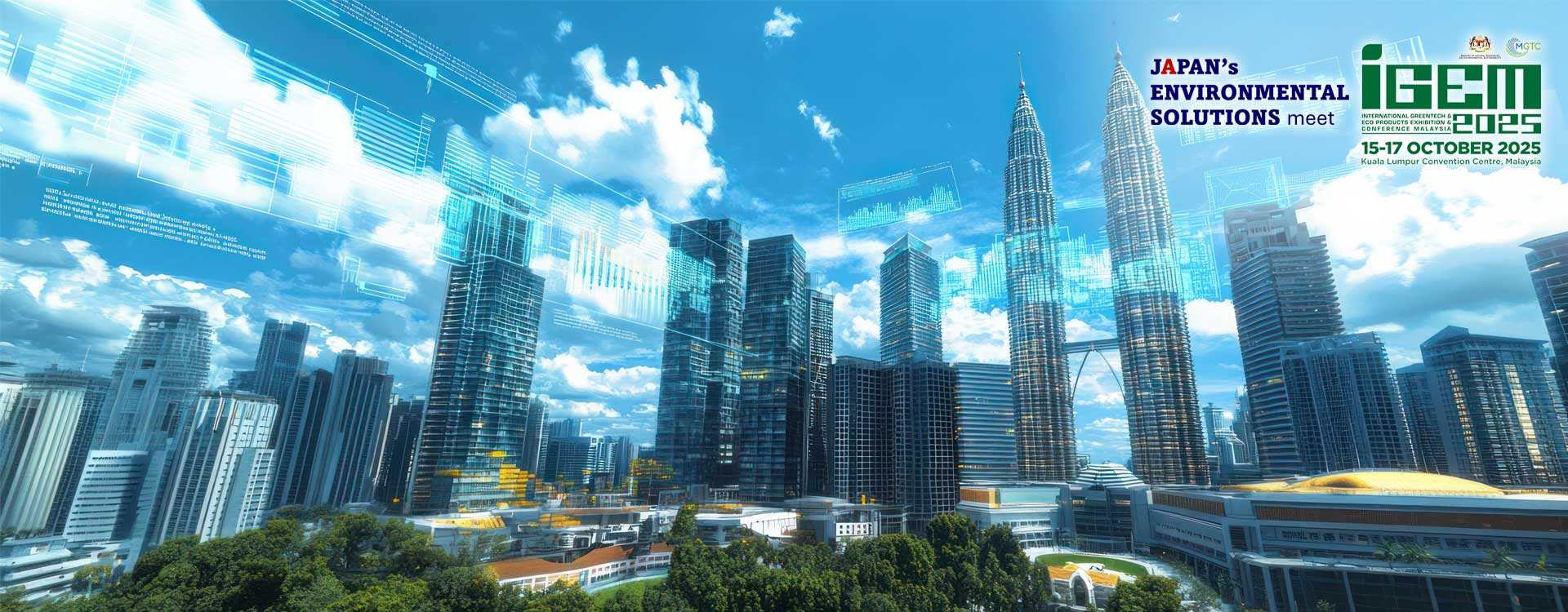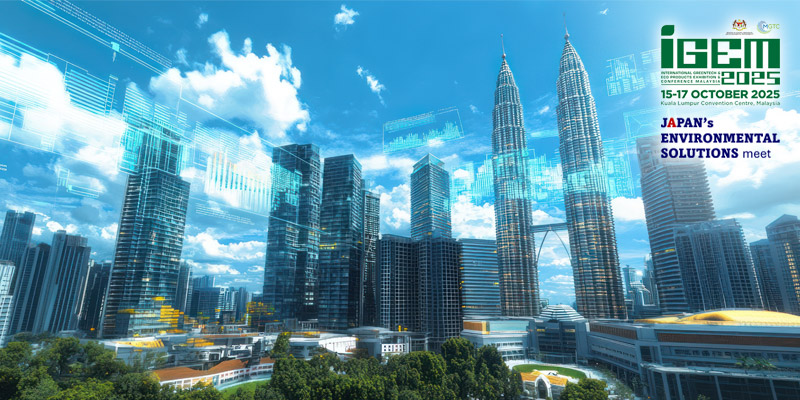

MALAYSIA-JAPAN
ENVIRONMENT WEEK
Event Report
Digest Video
Malaysia-Japan Environment Week Attracts 800+ Visitors, Showcasing Future Japanese / Malaysia Cooperation for Local Needs !
Environment Week is an event where environment-related ministries and agencies in Japan and partner countries collaborate to create opportunities for environmental businesses through integrated activities such as policy dialogues, exhibitions, business matching, seminars, and more. This event demonstrated the potential of Japanese technologies to effectively meet local environmental needs in Malaysia.
Since 2017, the event has been held in various Asian countries. From October 15 to 17, 2025, the Malaysia-Japan Environment Week was held in Kuala Lumpur in collaboration with the Ministry of Natural Resources and Environmental Sustainability and the Ministry of the Environment, Japan. The event was organized as a part of the International Greentech & Eco Products Exhibition and Conference Malaysia (IGEM) which is a Southeast Asia’s leading trade event for green technologies and eco solutions.
Contents of this article
Japanese Companies Highlight Their Cutting-Edge Technologies
Japanese companies at the forefront of energy efficiency, climate change mitigation and adaptation, waste management, and water environment improvement presented their cutting-edge technologies and solutions at the business pitch session and thematic seminars, offering innovative approaches to local environmental challenges.
To discover more advanced environmental technologies and solutions, please visit the JPRSI website.
Showcasing Japan’s Environmental Solutions at the Japan Pavilion
– High-Level Delegates Tour Every Booth!
Japanese companies, including local partners, exhibited their services and technologies during the event as the "Japan Pavilion".
Their booth was located in the foyer of the IGEM exhibition hall, which attracted a large number of visitors during the entire event.
Additionally, the State Minister of the Environment, Japan, toured the booth area. The exhibitors had an opportunity to introduced their commitment to the Minister directly.
Knowledge Sharing and Dialogue for Community-Level Green Transformation by Youth and Local Stakeholders from Both Countries
During the opening session, representatives from the Ministry of Natural Resources and Environmental Sustainability (NRES) of Malaysia, the Ministry of the Environment of Japan, the Embassy of Japan in Malaysia, Kuala Lumpur City, and Federation of Malaysian Manufacturing (FMM) delivered remarks. Each speaker underscored the significance of Malaysia-Japan cooperation in the environmental sector, the importance of accelerating the adoption of renewable energy, and expressed strong expectations for enhanced collaboration at the municipal level.
Keynote Speech:
A video message was delivered by Mr. Masao Uchibori, Governor of Fukushima Prefecture, highlighting Fukushima’s experience in balancing regional economic revitalization with initiatives to promote renewable energy and hydrogen utilization during the recovery process following the Great East Japan Earthquake, all in pursuit of the 2050 net-zero target. Subsequently, a presentation was given by the “Fukushima Carbon Neutral Ambassadors,” a group of university students from within the prefecture. The presentation conveyed Fukushima’s efforts and aspirations based on the lessons learned from the 3.11 disaster, structured around three perspectives: “Mission, Passion, and Action”. It also proposed solutions to regional challenges and pathways toward realizing a future green society, while calling for cross-generational and cross-sectoral engagement.
Panel Discussion:
Under the moderation of ICLEI Japan, students from Fukushima Prefecture, a student from the University of Malaya, and an urban planning officer from Kuala Lumpur City participated in a panel discussion. The exchange focused on advancing urban green transformation (GX), revitalizing local communities, and promoting urban planning centered on renewable energy. Mr. Nordin from Kuala Lumpur City emphasized that implementing concrete measures with citizen participation requires local government actions aligned with national targets. Following this, Ms. Juliana from the University of Malaya highlighted the importance of collaboration toward shared goals, drawing on her experience with projects in local cities. The Fukushima students emphasized that environmental initiatives and recovery efforts require not only goal-setting but also practical implementation, and noted that participation in Environment Week provided a valuable opportunity to engage with students from another country.
PLENARY SESSION: Panel Discussion
Toward the regenerative city: restore, renew, enhance

[Moderator]
Mr. UCHIDA Togo
Executive Director, ICLEI Japan

Mr. Rosli Nordin
Head of City Planning Department, Kuala Lumpur City

Ms. Juliana Wong Lin
The University of Malaya

Ms. SHIOTA Yuri
Ms. KOJIMA Ayano
Ms. NINOHIRA Miku
University students from Fukushima
Six Seminars Spotlight on Water / Waste Pollution Control, Climate Change, and More Through Public and Private Collaboration
Representatives from the governments, research institutions, and private sectors of Japan and Malaysia took the stage, sharing insights on policies and cutting-edge technologies in environmental fields and engaging in active discussions tailored to each theme.
Many participants expressed that it was a valuable opportunity to learn about specific best practices and policy development.
Presentations (185MB)Organized by the Ministry of Economy, Trade and Industry (METI), this session introduced the latest technological trends and corporate initiatives on Zero Energy Buildings (ZEB) and hydrogen/ammonia - flagship projects under the public-private initiative Cleaner Energy Future Initiative for ASEAN (CEFIA) - aimed at strengthening collaboration between Japan and Malaysia in promoting energy transition and decarbonization technologies.
Part 1 introduced Japan’s Zero Energy Building (ZEB) technologies, featuring high-performance insulation, reflective materials, BIPV/BAPV systems, and advanced automation for energy management-practical solutions supporting urban energy savings and smart city development.
Part 2 showcased hydrogen and ammonia technologies covering hydrogen supply chains, green hydrogen production, and ammonia co-firing. These presentations highlighted clean fuel applications for decarbonization and energy transition, reinforcing prospects for Malaysia-Japan collaboration in advancing clean energy technologies.
This session was co-organized by the Malaysian Green Technology and Climate Change Corporation (MGTC) and the Ministry of the Environment, Japan (MOEJ and focused on sustainable management of end-of-life vehicles (ELVs) and batteries, addressing resource circulation and recycling systems in Malaysia and Japan. With rising vehicle ownership, automotive waste has become a critical issue, underscoring the need for circular mobility policies and technologies. Opening remarks by MOEJ and NRES outlined recent policy developments on circular economy and extended producer responsibility (EPR), stressing the importance of recycling capacity, landfill reduction, and cross-sector collaboration. Japanese and Malaysian companies presented practical initiatives, including component reuse, safe battery collection and treatment, and recovery of valuable materials such as lithium and rare metals. These examples demonstrated how innovation and policy frameworks can drive sustainable mobility.
Participants shared insights on harmonizing regulations, developing human resources, and promoting industrial cooperation, reaffirming that collaboration among governments, manufacturers, and recyclers is essential to reducing environmental impact and advancing circular mobility.
This session examined Malaysia’s challenges in water environment and waste pollution control, focusing on sustainable infrastructure development and technical cooperation. Rapid urbanization and industrial growth have outpaced wastewater and solid waste management, worsening water pollution and waste generation. The keynote by Malaysia’s National Water Services Commission (SPAN) outlined the current water resource management framework, regulatory standards, and future policy directions.
Part 1 featured Japan’s Ministry of the Environment (MOEJ) introducing initiatives under the Model Project for the Improvement of the Water Environment in Asia, followed by Japanese companies presenting technologies such as decentralized treatment systems, industrial wastewater solutions, advanced purification, microplastic countermeasures, and digital monitoring (DX).
Part 2 highlighted Japan’s efforts to promote a sound material-cycle society and waste management technologies, with business cases on biomass boilers, low-temperature carbonization, hydrogen production, and waste-to-energy systems. Discussions emphasized reducing landfill waste, expanding recycling and energy recovery, and fostering collaboration among governments, industries, and communities to advance the circular economy and reduce environmental burdens.
This session introduced the Partnership to Strengthen Transparency for co-Innovation (PaSTI), an international initiative led by MOEJ to enhance greenhouse gas (GHG) measurement, reporting, and verification (MRV) systems in ASEAN countries. The discussion focused on promoting corporate transparency and data reliability in climate actions.
NRES and MOEJ presented ongoing collaborations under PaSTI, emphasizing the role of private-sector data management in supporting Nationally Determined Contribution (NDC). Malaysian policymakers shared updates on MRV system development and environmental disclosure initiatives.
Examples from regional partners, including the Philippines Securities and Exchange Commission and Bursa Malaysia, demonstrated how incentive mechanisms encourage corporate environmental reporting. Japanese participants introduced voluntary emission management systems and third-party verification practices.
Speakers highlighted the need to improve data accuracy, expand technical support, and strengthen coordination between government and industry. The session underscored the importance of corporate-led actions and public–private partnerships for achieving transparency in climate governance.
This session convened policymakers and private sector representatives from Malaysia and Japan on “Materializing Paris-aligned Climate Actions – Focused Government-to-Business Dialogue on Climate Policy and Technology Solutions-,” aiming to integrate policies, technologies, and businesses to advance decarbonization and climate adaptation. Opening remarks by NRES and MOEJ outlined Malaysia’s National Climate Change Policy and the National Energy Transition Roadmap (NETR), and Japan’s cooperation mechanisms such as the Joint Crediting Mechanism (JCM), reaffirming commitments to low-carbon business initiatives.
Part 1 addressed decarbonization in industry, energy, and urban infrastructure, featuring initiatives on CCS, waste-to-energy, renewable energy, refrigerant management, and energy efficiency via cogeneration and BioCNG. Speakers stressed policy support, investment environments, and technology transfer for long-term cooperation.
Part 2 focused on climate adaptation and regional collaboration, presenting strategies for heat mitigation, water resource management, Nature-based Solutions (NbS), and community-based disaster risk reduction. Discussions emphasized balancing technology deployment with local engagement and private investment. Both countries shared the view that, while utilizing existing initiatives, public and private sectors should collaborate to further advance climate action.
This session, co-organized by the ASEAN-Japan Centre and Malaysia External Trade Development Corporation (MATRADE), focused on creating sustainable value from waste through ASEAN-Japancollaboration. As waste generation rises with economic growth, the session highlighted innovative business models that transform waste into resources within a circular economy framework. Opening remarks by the ASEAN-Japan Centre emphasized the importance of partnerships to promote recycling, reuse, and resource recovery. Presentations by companies and organizations from ASEAN and Japan showcased examples of converting waste into new materials, products, and energy sources. Practical cases from manufacturing, food processing, and materials industries—including plastics, paper, and metals—were introduced. Discussions also addressed improving waste collection and sorting systems and developing locally integrated upcycling models.
Participants emphasized viewing waste as a resource with economic potential and highlighted collaborative innovation between ASEAN and Japanese companies as key to building circular business ecosystems and expanding sustainable markets. The session concluded by reaffirming the potential of ASEAN-Japan partnerships to advance a “value-creating circular economy” supporting regional sustainable growth.
Voice from exhibitors and visitors
-
Opportunities for Wider Company Promotion
We were able to hear the opinions of a new customer base since many visitors from IGEM had different attributes from our expectations. -
Valuable Connections in the Local Partner in Malaysia
It was meaningful to be able to talk with local companies that could potentially become partners. -
Public-Private Collaboration and Future Potential
It was good that our technology was understood by many people, especially the government agencies and the government sector. -
Solutions from Both Perspectives
There were speakers from both Malaysia and Japan, and there was lively input and exchange of opinions from both sides. -
Diverse and Engaging Discussion
It is very interesting as the forum session discussed various engaging issue related to how to manage waste in our environment.


























